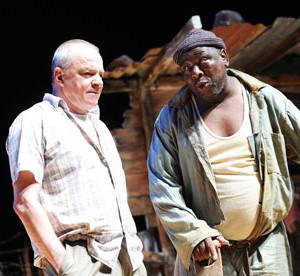Hampstead Theatre
Until 4th December
Athol Fugard based his play on this story, though he changes some details. He looks at the impact of the woman’s death on the train driver, asking big questions on how humans can move on from tragedy and whether we can ever sympathise with suicide victims. There are no clear-cut answers, but essentially there’s more to experience in this funny, poignant and unusual play set in a graveyard in post Apartheid South Africa.
The driver, Roelf (played by Sean Taylor), far from being simply ‘traumatised’ as the newspaper reported, takes on complete responsibility for the dead woman. He leaves his wife and family and ends up staying night after night in the company of the grave-digger who buried her. Roelf’s problem however, is also his strength – his obsession is symptomatic of the depth of his humanity and understanding.
He can’t get on with his life knowing the woman’s body was never claimed and that no one knows her name. For him, belonging to someone, having a name – these are all expressions of love and he cannot bear that she lies in her grave unloved in death as she clearly was in life. He delivers a moving soliloquy to the imagined lady in the graveyard, saying he will claim her.
In contrast, Simon the gravedigger (played by Owen Sejake) has a wildly different perspective on death. When Roelf seeks out his help in finding the woman’s grave, we immediately get a sense of his no nonsense approach. ‘I must dig deep because the dogs come…they are hungry’ he says and he casually marks the graves with old tires and plastic bottles. Because it lies in such contrast to Roelf it forces us to ask which perspective is right. There’s no easy answer because both characters warrant sympathy. Simon is offhand but also kind– he sweetly refers to the bodies as ‘sleeping’ and he lives and works in the graveyard, which shows some dedication. What I took from this is an appreciation of the different ways we deal with death, which is influenced by culture and experience, and that neither is right nor wrong.
There’s a shock, or a twist at the end of the play, which I won’t spoil by revealing here. Suffice to say, it sent chills down the spine and was not expected. I can say it made me look at the woman’s suicide differently. Is Roelf’s scrabbling about in graveyards and wallowing on past tragedies a sort of suicide bid as well? We can all decide against living, it doesn’t necessarily involve standing in front of a train. The twist was important because it builds our sympathy with the young woman, who has done this unspeakable thing – killing her own child – and to care about her, we have to understand her motives.
All this talk of graveyards, death and suicide might lead to the wrong conclusion that this is a heavy play. It’s not. There are funny moments – the contrast between the plodding Simon and the passionate Roelf is comical. The acting is also so natural you can’t believe they do acting for a job and aren’t in real fact the characters they portray. But it is a play that will start a debate in your head that won’t ever be concluded. It will also challenge you to sympathise with characters whose stories you might not have heard otherwise. Enthralling from start to finish and highly recommended.





